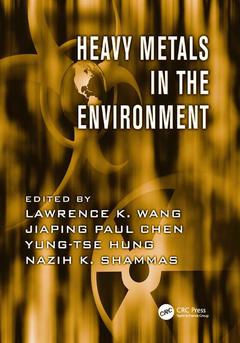Description
Heavy Metals in the Environment
Advances in Industrial and Hazardous Wastes Treatment Series
Coordinators: Wang Lawrence K., Chen Jiaping Paul, Hung Yung-Tse, Shammas Nazih K.
Language: English
Subjects for Heavy Metals in the Environment:
Keywords
Ef Uents; Metal Nishing; Environmental Behavior and Effects of Engineered Metal; Aerobic Granules; Nanotechnology Application; Clari Er; Management and Treatment; Ion Exchange; Control; Management; and Treatment of Metal Emissons; Heavy Metal Removal; Metal Research Trends; Universal Waste; Brown Elds Sites; Arsenic Removal; Metal Removal; Te Ch; Site Assessment; NF Membrane; Multimetal Solutions; Metal Ions; Granular Sludge; Reductive Dissolution; Brown Elds; Metal Nishing Industry; Anaerobic Granule; Sulfuric Acid; XPS Survey Scanning Spectrum; Electrokinetic Remediation; Soil Ushing; Vitri Cation
Publication date: 05-2017
· 17.8x25.4 cm · Paperback
Publication date: 06-2009
514 p. · 17.8x25.4 cm · Hardback
Description
/li>Contents
/li>Readership
/li>Biography
/li>
A successful modern heavy metal control program for any industry will include not only traditional water pollution control, but also air pollution control, soil conservation, site remediation, groundwater protection, public health management, solid waste disposal, and combined industrial-municipal heavy metal waste management. In fact, it should be a total environmental control program. Comprehensive in scope, Heavy Metals in the Environment provides technical and economical information on the development of a feasible total heavy metal control program that can benefit industry and local municipalities.
The book discusses the importance and contamination of metals such as lead, chromium, cadmium, zinc, copper, nickel, iron, and mercury. It covers important research of metals in the environment, the processes and mechanisms for metals control and removal, the environmental behavior and effects of engineered metal and metal oxide nanoparticles, environmental geochemistry of high arsenic aquifer systems, nano-technology applications in metal ion adsorption, biosorption of metals, and heavy metal removal by expopolysaccharide-producing cyanobacteria. The authors delineate technologies for metals treatment and management, metal bearing effluents, metal-contaminated solid wastes, metal finishing industry wastes and brownfield sites, and arsenic-contaminated groundwater streams. They also discuss control, treatment, and management of metal emissions from motor vehicles.
The authors reflect the breadth of the field and draw on personal experiences to provide an in-depth presentation of environmental pollution sources, waste characteristics, control technologies, management strategies, facility innovations, process alternatives, costs, case histories, effluent standards, and future trends for each industrial or commercial operation. The methodologies and technologies discussed are directly applicable to the waste management problems that must be met in all industries.
Metal Research Trends in the Environmental Field. Toxicity and Sources of Pb, Cd, Hg, Cr, As, and Radionuclides in the Environment. Environmental Behavior and Effects of Engineered Metal and Metal Oxide Nanoparticles. Heavy Metal Removal with Exopolysaccharide-Producing Cyanobacteria. Environmental Geochemistry of High-Arsenic Aquifer Systems. Nanotechnology Application in Metal Ion Adsorption. Biosorption of Metals onto Granular Sludge. Arsenic Pollution: Occurrence, Distribution, and Technologies. Treatment of Metal-Bearing Effluents: Removal and Recovery. Management and Treatment of Acid Pickling Wastes Containing Heavy Metals. Treatment and Management of Metal Finishing Industry Wastes. Recycling and Disposal of Hazardous Solid Wastes Containing Heavy Metals and Other Toxic Substances. Management and Removal of Heavy Metals from Contaminated Soil. Remediation of Metal Finishing Brownfi eld Sites. Control, Management, and Treatment of Metal Emissons from Motor Vehicles. Index.
Lawrence K. Wang has over 25 years of experience in facility design, plant construction, operation, and management. He has expertise in water supply, air pollution control, solid waste disposal, water resources, waste treatment, hazardous waste management, and site remediation. He is a retired dean/director of both the Lenox Institute of Water Technology and Krofta Engineering Corporation, Lenox, Massachusetts, and a retired vice president of Zorex Corporation, Newtonville, New York. Dr. Wang is the author of over 700 technical papers and 19 books, and is credited with 24 U.S. patents and 5 foreign patents. He received his BSCE degree from the National Cheng-Kung University, Taiwan, his MS degrees from both the Missouri University of Science and Technology and the University of Rhode Island and his PhD degree from Rutgers University, New Jersey.
Jiaping Paul Chen is a professor of Environmental Science and Engineering in the National University of Singapore. His research interests are physicochemical treatment of water and wastewater and modeling. He has published more than 80 journal papers and book chapters with citation of above 1000 and H-index of 18. He has received various honors and awards, including Guest Professor of the Hua Zhong University of Science and Technology, and Shandong University of China, and Distinguished Overseas Chinese Young Scholar of National Natural Science Foundation of China. He is recognized as an Author of highly cited papers (Chemistry and Engineering) of ISI Web of Knowledge. Dr Chen received his ME degree from the Tsinghua University of Beijing and his PhD degree from the Georgia Institute of Technology of Atlanta, Georgia.
Nazih K. Shammas has been an environmental expert, professor, and consultant for over 40 years. He is an ex-dean and director of the Lenox Institute of Water Technology, and advisor to Krofta Engineering Corporation, Lenox, Massachusetts. Dr. S




